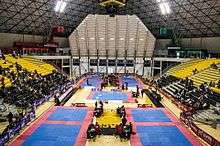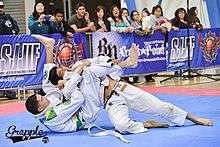Sport Jiu Jitsu International Federation
| Abbreviation | SJJIF |
|---|---|
| Formation | 2011 |
| Type | Sports federation |
| Purpose | Governing, Regulatory |
| Headquarters | Los Angeles, United States |
Region served | Worldwide |
Membership | sjjif.com/membership.php |
Official language | English, Portuguese |
Presidents | Joao Silva, Patricia Silva e Sam Aschidamini |
| Affiliations | NABJJF, SJJSAF, ESJJF, ASJJF |
| Website | sjjif.com |

Sport Jiu-Jitsu also known as Brazilian Jiu-Jitsu, BJJ , Jiu Jitsu Brasileiro
Sport Jiu Jitsu International Federation (SJJIF) History
The Jiu-Jitsu Federation of Guanabara, in Rio de Janeiro, was founded on April 25 1967. The federation was established under the authorization of the National Sports Confederation of that country. The federation was founded by five founding schools and it was articulated by Hélio Gracie, Alvaro Barreto, Joao Alberto Barreto, Hélcio Leal Binda and Oswaldo Fadda.
The president of the Federation was Helio Gracie, and the Chairman of the Advisory Council was Carlos Gracie. His firstborn, Carlson Gracie, was the director of the technical department. The first vice technician was Fadda and the second, Orlando Barradas - both Jiu-Jitsu Professors. Joao Alberto Barreto, outstanding student of the Gracie’s, was appointed director of the education department, which had as deputy director Robson Gracie – all now known as great masters of the art.
The Jiu-Jitsu Federation of Guanabara (Jiu-Jitsu Federation of Guanabara History) was chaired by Hélio Gracie and had sport bases, regulations, etc. The foundation of the Federation was the first step to make Jiu-Jitsu a sport and not a street fighting art. The art of jiu-jitsu began to have structure and organization. The orders of graduation tracks were regulated: white, blue, purple, brown and black. The yellow bands, orange and green, were granted only for children. If the practitioner was greater than 16 years, they would directly be promoted from white to blue. In addition, the rules for any championships organized by them were regulated. In the rules, maneuvers like take-downs, mount with both knees on the floor or back with hooks awarded the competitor points. The duration of the contest in the adult category was five minutes with extension of three. Jiu-Jitsu officially earned time and scores.
In June 1973, Jiu Jitsu was finally legally recognized as a sport in Brazil and in December 1973, the Federation Jiu-Jitsu Guanabara organized their first championship the “1º Torneio Oficial de Jiu-Jítsu do Brasil” hosted in Rio de Janeiro, at the Athletic Association Bank of Brazil beginning a new era for Jiu-Jitsu as a sport.
After the implementation of Jiu-Jitsu as a sport, it had fast growth throughout Brazil and in 1980 Jiu-Jitsu began to develop internationally. Due to all founders, professors, representatives and participants at that time being Brazilians the name Brazilian Jiu-jitsu was acquired for this art. With the increase of Brazilian Jiu Jitsu many academies, teams, events, tournaments, and federations have been created to improve the sport, yet at the same time resulting in some politics between teams and federations that have delayed the prosperity and development of the sport.
By 2011, Jiu-Jitsu or Brazilian Jiu-Jitsu was a sport practiced and recognized worldwide, but it did not have an established federation that met the IOC requirements and/or that was recognized as a single international governing body for the sport. With this in mind and main motivating factor a group of Jiu-Jitsu professors and tournament organizers thought that it was time to invest and dedicate themselves in the growth of the sport.
Thus, in June 2011 the Sport Jiu-Jitsu International Federation or SJJIF was founded by professors Joao Silva, Patricia Silva, Samuel Aschidamini, Cleiber Maia, Edison Kagohara, and Marcello Rosa. SJJIF hosted its first international event, the SJJIF Worlds, on December 14 and 15 of 2013 at the Long Beach Pyramid in Long Beach, California USA. They believed that by creating this federation it would benefit and enable positive growth of the sport, organize it, and meet the IOC requirements with easier rules and better understanding of the sport by both practitioners and non-practitioners. This federation would also help the growth of the sport by tracking the number of existing participants in the sport and ranking them by their performance in sanctioned events. Last but not least, create community events to promote, teach, and educate all practitioners and non practitioners on this great sport.
The SJJIF has grown tremendously since its founding and it has already had sanctioned events and federations in North America, South America, Asia, Europe, Africa and Oceania.
Mission
The mission of the SJJIF is to acquire International Olympic Committee sport recognition and admittance into the Olympic program as a competing event of the Olympic Games, Paralympic Games, and Deaflympics and in all other games of the Olympic cycle by uniting, organizing, and providing effective international governance to the sport of Jiu- Jitsu.
- The SJJIF embraces the general and fundamental principles of the Olympic Charter, Paralympic Charter, and Deaflympic Charter; and furthermore, aims to promote these fundamental principles in all activities.
- The SJJIF aims to respect and preserve the history of Jiu-Jitsu and ensure lineage of all participants.
- The SJJIF aims to promote, expand, organize, improve, regulate and popularize worldwide the practice of Jiu-Jitsu in light of its educational, cultural, and sports values (the “Jiu-Jitsu movement”); and to improve the health worldwide through its practice.
- The SJJIF aims to protect the physical and mental health of the athletes, promoting the importance of youth development, fair competition, respect, equality, cooperation, peace, and friendship.
- The SJJIF aims to strengthen the Sport Jiu-Jitsu, Brazilian Jiu-Jitsu, and Jiu-Jitsu communities, contributing to the development of friendly relationships among the National Federations, and of defending the interests of Jiu-Jitsu throughout the world.
- The SJJIF will organize the annual Worlds Jiu-Jitsu Gi and No Gi Championship in collaboration with member federations. The right to organize World Championships and other official SJJIF events shall be granted only to countries that are able to receive all the eligible participants and delegates on their territory.
- The SJJIF will provide organizational and promotional support to all member federations and SJJIF sanctioned events, as appropriate.
- The SJJIF aims to continue improving the technical rules regulating Jiu-Jitsu competitions sanctioned or promoted by the SJJIF, including the Jiu-Jitsu event of the Olympic Games, Paralympic Games, and Deaflympics.
- The SJJIF aims to continue improving standards pertaining to various items of clothing and equipment used within the sport of Jiu-Jitsu.
- The SJJIF aims to adopt, implement, and promulgate the World Anti-Doping Agency Code.
- The SJJIF aims to respect the principles of democracy, equality and harmony within the sport of Jiu-Jitsu. To oppose all forms of racial, political, religious, cultural, ideological and gender discrimination and to oppose discrimination based on internal factions within the sport of Jiu-Jitsu.
- The SJJIF aims to promote the educational, scientific, literary and charitable aspects of the sport, improving cultural and sporting contacts between the Jiu-Jitsu nations of the world.
- The SJJIF aims to engage in other activities in support of the above objectives.
SJJIF Tournaments


- Annual North American BJJ Tournament(NABJJ);
- SJJIF Worlds Gi & NoGi Tournament(NABJJ);
- All Americas Jiu Jitsu Tournament(NABJJ)
- Los Angeles International Jiu Jitsu Open(NABJJ)
- Lone Star State Jiu Jitsu Championship(NABJJ)
- Sunshine State Jiu Jitsu Open(NABJJ)
- New Jersey Brazilian Jiu Jitsu International(NABJJ)
- Nationals Gi & No Gi(NABJJ)
- Grand Canyon State Gi & No Gi Open(NABJJ)
- Rio International Challenge(SJJSAF)
- Sul Americano Open(SJJSAF)
- Campeonato Panamericano(SJJSAF)
- Pan-Americano(SJJSAF)
- Sao Paulo International Challenge(SJJSAF)
- Brasil Open(SJJSAF)
- Copa Progresso(SJJSAF)
- Portugal Open(ESJJF)
- Asian Open(ASJJF)
- Japan Open(ASJJF)
- Philippine International Open Tournament(ASJJF)
- China International Open Tournament(ASJJF)